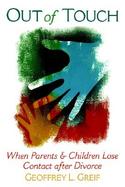Out of Touch When Parents and Children Lose Contact After Divorce
- List Price: $48.99
- Binding: Hardcover
- Publisher: Oxford Univ Pr on Demand
- Publish date: 04/01/1997
-- Vividly and often heartbreakingly presents all the ways that fathers and mothers, even with the best intentions, can lose contact with their children
-- Draws on twenty-six in-depth interviews with estranged parents and the children
-- Shows how families can employ support systems, communication skills, mediation, and other strategies to overcome the moat difficult obstacles that occur after a divorce
The breakdown of the family has moved in recent years to the forefront of national consciousness. All manner of social ills, from poor academic performance to teenage drug use and gang crime, have been attributed to high divorce rates and the collapse of the traditional two-parent family. Targets of particularly harsh criticism are parents who lose all contact with their children after a divorce. So-called "deadbeat dads" are denounced in political speeches and ridiculed on billboard advertisements; mothers who lose touch with their children are stigmatized as emotionally unstable or lacking maternal instincts. Everyone seems to understand the importance of children being raised by two-parent families and the damage that can occur when one parent loses contact completely. What is significantly less clear is why this loss of contact occurs and what can be done to prevent it.
In Out of Touch, Geoffrey Greif explores these issues with clarity, compassion, insight, and an evenhandedness rarely encountered in an arena far more susceptible to acrimonious debate than sympathetic understanding. Setting out to find the reality beneath the catchall categorization of out-of-touch parents asdeadbeats, substance abusers, child mistreaters, or criminals, Greif focuses on those parents who tried and, for a vast array of reasons, failed to maintain contact with their children. It is their voices, in a discussion dominated up till now by the custodial parent, that we most need to hear, Greif argues, if we are to uncover ways to avoid such failures in the future. Rather than offering dry statistics and abstract generalizations, Greif lets us hear these voices directly in 26 in-depth interviews with estranged parents and with children caught in the crossfire of painful divorces. Extending over a period of two to ten years, these interviews, and Greif's perceptive analyses of them, reveal the whole spectrum of logistical, emotional, and legal difficulties that keep parents and children apart. From the ordinary problems of visitation rights and child support to the more complex and troubling issues -- bitter court battles, accusations of sexual abuse, domestic violence, children rejecting a parent, child kidnapping, and many others -- Out of Touch vividly and often heartbreakingly presents all the ways that fathers and mothers, even with the best intentions, can lose contact with their children. But the book does more than tell the stories of failed relationships. Its concluding chapter offers a series of specific and extremely helpful suggestions for families -- parents, children, grandparents -- who find themselves in danger of complete estrangement. Greif outlines how families can employ support systems, communication skills, mediation, and many other strategies to overcome the most difficult obstacles that occur after a divorce. It is here that the lessons gleaned from thebroken relationships of the past become invaluable advice for the future.
Informed by fresh perspectives, moving personal accounts, and a clear-sighted approach to a tangled issue, Out of Touch is a timely and deeply important book about both the forces that drive parents and children apart and the understanding that can keep them together.
| Seller | Condition | Comments | Price |
|
Project HOME
|
Good
|
$3.32
|
|
Ergodebooks
|
Good |
$6.44
|
|
Montclair Book Center
|
Good
|
$10.12
|
|
Daedalus Books
|
Like New
|
$14.57
|


